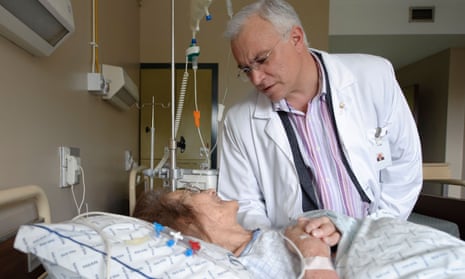About 2 million elderly people in the UK are on at least seven different medications and at risk of potentially life-threatening harm from interactions between the drugs or side-effects from pills that are no longer right for them.
Older people are being let down by a healthcare system that is allowing medicines to do more harm than good, according to a report from Age UK. One in five prescriptions for elderly people living at home are inappropriate, it said. Care home residents take an average of at least eight medicines, with a one in 10 risk of a mistake when the drugs are prescribed or given to them.
More is not always better, said the report. Doctors tend to add new tablets each time an elderly person develops another health condition, but without stopping the old ones.
The more medicines elderly people take, the greater their risk of having a fall, which can put them in hospital. Nearly 1,000 older people a day are admitted to hospital because of falls, and their chance of falling again if they are over 65 goes up by 14% for every extra medicine they take over the first four, said the report.
Adverse drug reactions cause nearly 6% of unplanned hospital admissions, the report said. In one in 50 cases, the reaction is fatal.
Side-effects of medicines given to the elderly include nausea, dizziness, loss of appetite, low mood, weight loss, muscle weakness and delirium. As people get older, their ability to process medicines changes and they become more susceptible to side-effects. Opioid painkillers, for instance, should only be used at a quarter to half the normal dose.
Elderly people on various medications – known as polypharmacy – should have regular reviews of their drugs to ensure they are needed. The report tells of people struggling to cope with all the drugs they have been prescribed, such as 77-year-old Jane who is taking 17 medications, five of which have to be taken at least three times a day for a range of conditions including epilepsy, high blood pressure, hypothyroidism, COPD, osteoarthritis, psoriasis and vertigo.
Anne, 84 and living alone, is on 19 medications for conditions including ulcerative colitis, hypertension, asthma and osteoarthritis. She was discharged from hospital with three bags of medications but no record for her carers or the GP of what they were or when they should be taken.
Age UK said medicines in many cases allow older people to live in better health. “We are incredibly fortunate to live at a time when there are so many effective drugs available to treat older people’s health conditions, but it’s a big potential problem if singly or in combination these drugs produce side-effects that ultimately do an older person more harm than good,” said Age UK’s charity director, Caroline Abrahams.
“That’s why it is really important that a clinician, typically your GP, has a good overview of all your medicines and considers from time to time with you whether they are still the best for your health, not only on their own but when taken together with the other medications you are on.”
Dr Henry Woodford, the chair of the drugs and prescribing special interest group at the British Geriatrics Society, said he recognised the picture painted in the report. “It’s something I see on a day to day basis,” he said. “It’s a complex problem. Older people accumulate a lot of diseases over time. Medications are prescribed because that’s in the guidelines for the disease.”
The medicines, however, have not been tested in trials in combination with other drugs or they might have been tested on 60-year-olds but not people over 70. “It is certainly something we need to take steps to tackle,” he said.
Age UK wants the government to take full account of the harmful effects of inappropriate multiple medications on older people in its planned review of NHS overprescribing.
The report points out that non-drug treatments can also be tried. “Physical activity can help treat depression, lower blood pressure, reduce the amount of insulin someone with type 1 diabetes needs to manage their condition and even improve survival from breast and colon cancer.
“Also non-drug approaches like sensory therapy, massage, music and exercise may be more effective and safer than medicines for managing challenging behaviour in people with dementia,” it said.










